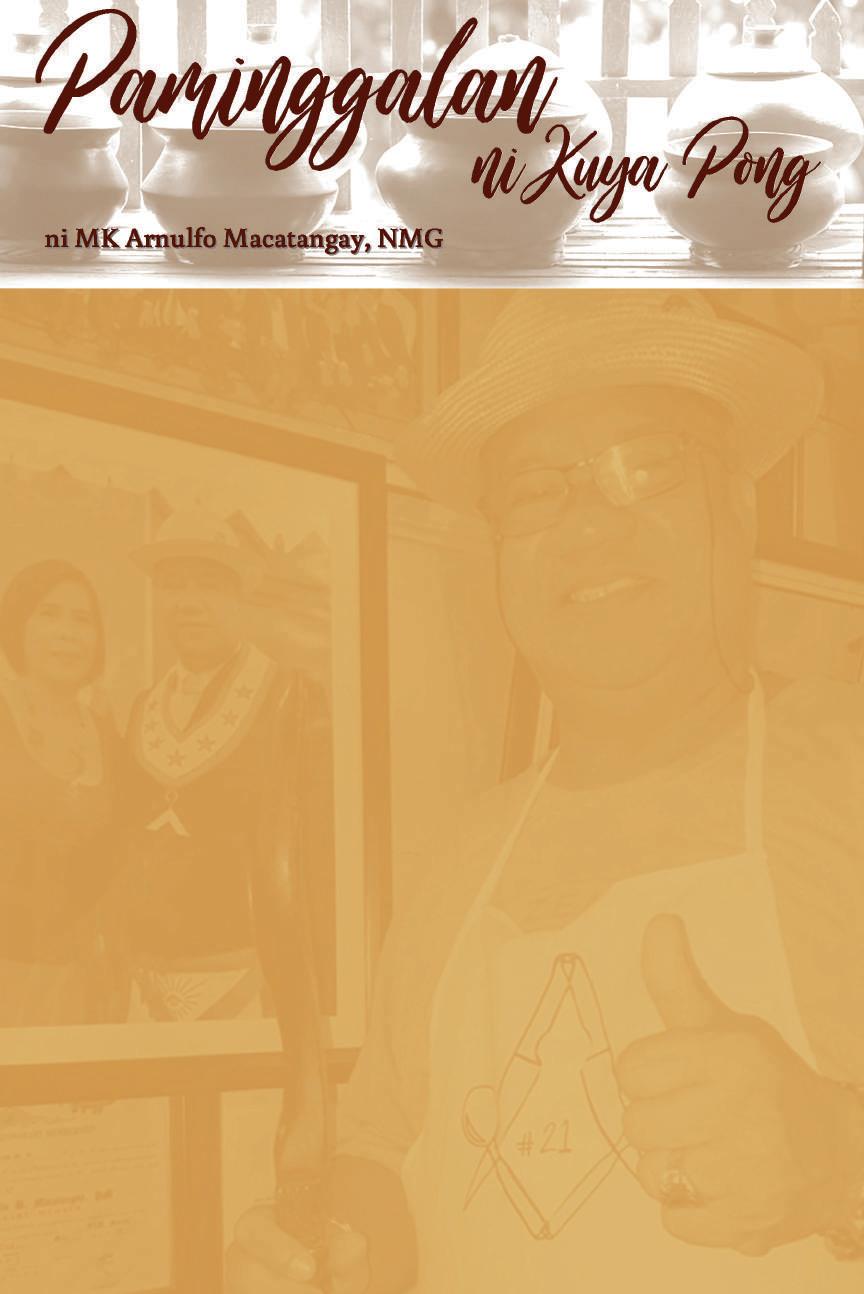9 minute read
Mental Health during Pandemic
MENTAL HEALTH IN THE MIDST OF THE PANDEMIC
The month of April has just ended marking the first full turn of the world as it is continuously facing the pandemic brought about by the nCoV, now widely known as COVID-19. In the span of this on-going global medical crisis, people are not only faced by issues concerning their health but is also burdened by the possibility of this contagion to take a toll on one’s mental well-being. As we are bounded by the four walls of our homes, our way of living has radically changed over time. This sudden reform may influence how we see the world from our own points of view. Uncertainties in our current society may inhibit a sense of isolation that can lead to stress and anxiety, and other related state. The situation serves as a call for us to look after our state of health as well as the various aspects of ourselves. It is only natural that we don’t feel at our best during these times and is not something that we should fret about. As a way for us to overcome these sentiments, we should be able to recognize our emotions and effectively adapt to the ever-changing environment in order for us to track down the roots of such worries and / or issues.
The World Health Organization has released a management guide entitled Mental Health Considerations during COVID-19 Outbreak, with the hopes of helping its readers cope with their stressors and further improve their current mental state. Even at present, discussing one’s mental health is still considered taboo by many. Those who are experiencing the dilemma of this sort find it extremely difficult to cope as they do not receive much help from the people around them. Hence the necessity of such articles and reports tackling matters concerning one’s mental health during this time period. Along with the uncertainty of the current global situation, it is very timely that these types of guides have come to surface. Even if the time comes wherein the world has eradicated the pandemic, journals such as this will remain relevant to citizens. As one manages to use this article to its extent, the ripple must not stay stagnant. Handing over knowledge and wisdom regarding matters concerning one’s mental health will serve as a huge stepping-stone for possible future instances.
Aside from habitually washing our hands and disinfecting our belongings, one should also be invested in prioritizing his or her mental state. The extensive range concerning self-care is abundant in our daily lives, we only need to recognize and acknowledge our feelings in order to heed its indicators. Self-care may sound like a set of habits, but these are considered to be building foundations of a person’s level of functioning.
Here are the simplified mental health considerations during Covid-19 from the WHO:
GENERAL POPULATION
1. COVID-19 has and is likely to affect people from different countries and geographical locations. Don’t attach it to any ethnicity or nationality. Be empathetic to those who got affected, those with the disease have not done anything wrong.
2. Don’t - refer to people with the disease as “COVID-19 cases”, “victims” “COVID-19 families” or the “diseased”. They are people who have COVID-19, people who are being treated for COVID-19, or people who are recovering from COVID-19. After their recovery, their life will go on with their loved ones, families, and jobs. 3. Avoid watching, reading, or listening to news that cause you to feel anxious or distressed. Seek information mainly to take practical steps, to help you plan ahead, and protect yourself and loved ones. Seek information updates at specific times during the day (just once or twice). The sudden and near-constant stream of news reports about an outbreak can cause anyone to feel worried. Get the facts. Gather information at regular intervals, from WHO website and local health authorities platforms, in order to help you distinguish facts from rumors. 4. Protect yourself and be supportive to others. Assisting others in their time of need can benefit the person receiving support as well as the helper. 5. Find opportunities to amplify the voices, positive stories, and positive images of local people who have experienced the new coronavirus (COVID-19) and have recovered or who have supported a loved one through recovery and are willing to share their experience. 6. Honor caretakers and healthcare workers supporting people affected with COVID-19 in your community. Acknowledge the role they play to save lives and keep your loved ones safe.
HEALTH CARE WORKERS
7. For health workers, feeling stressed is an experience that you and many of your health worker colleagues are likely going through. In fact, it is quite normal to be feeling this way in the current situation. Stress and the feelings associated with it are by no means a reflection that you cannot do your job or that you are weak. Managing your stress and psychosocial wellbeing during this time is as important as managing your physical health. 8. Take care of your basic needs and employ helpful coping strategies - ensure rest and respite during work or between shifts, eat sufficient and healthy food, engage in physical activities, and stay in contact with family and friends. Avoid using unhelpful coping strategies such as tobacco, alcohol, or other drugs. In the long term, these can worsen your mental and physical wellbeing. This is a unique and unprecedent scenario for many workers, particularly if they have not been involved in similar responses. Even so, using the strategies that you have used in the past to manage times of stress can benefit you now. The strategies to benefit feelings of stress are the same, even if the scenario is different. 9. Some workers may unfortunately experience avoidance by their family or community due to stigma or fear. This can make an already challenging situation more difficult. Staying connected with your loved ones even through digital methods is one way to maintain contact. Turn to your colleagues, your manager, or other trusted persons for social support - your colleagues may be having similar experiences to you. 10. Use understandable ways to share messages with people with intellectual, cognitive, and psychosocial disabilities. Forms of communication that do not rely solely on written information should be utilized If you are a team leader or manager in a health facility. 11. Keeping all staff protected from chronic stress and poor mental health during this response means that they will have a better capacity to fulfil their roles. 12. Ensure that quality communication and accurate information updates are provided to all staff. Rotate workers from high-stress to lowerstress functions. Partner inexperienced workers with their more experiences colleagues. The buddy system helps to provide support, monitor stress, and reinforce safety procedures. Ensure that outreach personnel enter the community in pairs. Initiate, encourage, and monitor work breaks. Implement flexible schedules for workers who are directly impacted or have a family member impacted by a stressful event. 13. If you are a team leader or manager in a health facility, facilitate access to, and ensure staff are aware of where they can access mental health and psychosocial support services. Managers and team leads are also facing similar stressors as their staff, and potentially additional pressure in the level of responsibility of their role. It is important that the above provisions and strategies are in place for both workers and managers, and that managers are able to rolemodel self-care strategies to mitigate stress. 14. Orient responders, including nurses, ambu-
lance drivers, volunteers, case identifiers, teachers, and community leaders and workers in quarantine sites, on how to provide basic emotional and practical support to affected people using psychological first aid.
FOR CARETAKERS OF OLDER ADULTS
FOR CARETAKERS OF CHILDREN
15. Help children find positive ways to express disturbing feelings such as fear and sadness. Every child has his / her own way to express emotions. Engaging in a creative activity, such as playing, and drawing can facilitate this process. Children feel relieved if they can express and communicate their disturbing feelings in a safe and supportive environment. 16. Keep children close to their parents and family if considered safe for the child. Avoid separating children and their caregivers as much as possible. If separation is necessary, ensure that appropriate alternative care is available ( eg a social worker or equivalent) to check on the child regularly. It is essential that during periods of separation, regular contact with parents and caregivers is maintained - such as a scheduled phone or video calls or other ageappropriate communication at least twice a day. Access to social media may vary depending on the age of the child. 17. Maintain familiar routines in daily life as much as possible, especially if children are confined to home. Provide engaging age-appropriate activities for children. Encourage children to continue to play and socialize with others, even if only within the family when advised to restrict social contract. 18. During times of stress and crisis, it is common for children to seek more attachment and be more demanding on parents. Discuss the COVID-19 with your Children in honest and age-appropriate information. If your children have concerns, addressing those together may ease their anxiety. Children will observe adults’ behaviors and emotions for cues on how to man19. Older adults, especially those in isolation and those with cognitive decline like dementia, may become more anxious, angry, stressed, agitated, and withdrawn during the outbreak or while in quarantine. Provide practical and emotional support through informal networks (families) and health professionals. 20. Share simple facts about what is going on and give clear information about how to reduce risk of infection in words older people (with / without cognitive impairment) can understand. Repeat the information whenever necessary. Instructions need to be communicated in a clear, concise, respectful, and patient way. It may also be helpful for information to be displayed in writing or pictures. Engage their family and other support networks in providing information and helping them practice prevention measures (e.g., handwashing etc.) 21. Encourage older adults with expertise, experiences, and strengths to volunteer in community efforts to respond to the COVID-19 outbreak. The well, healthy, and retired population can provide peer support, neighbor-checking, and childcare for medical personnel restricted in hospitals fighting against COVID-19.
PEOPLE IN ISOLATION
22. Stay connected and maintain your social networks. Even while isolated, try as much as possible to keep your personal daily routines. If health authorities have recommended limiting your physical social contact to contain the outbreak, stay connected via e-mail, social media, video conference and telephone. 23. During times of stress, pay attention to your own needs and feelings. Engage in healthy activities that you enjoy and find relaxing. Exercise regularly, keep regular sleep routines and












